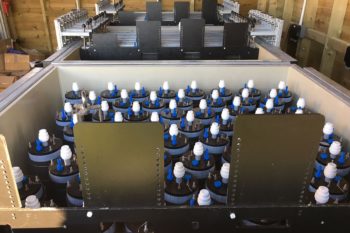METREAU: Microbial Electrochemical Technologies for REsource recovery And Utilisation
Competition: Breakthrough 4: Catalyst
Amount awarded: £1,656,489
Led by: Northumbrian Water
Partners: Isle Utilities, METzero, Newcastle University, Thames Water, Yorkshire Water
Estimated completion date: September 2026
Water cycle tag: Bioresources, resource recovery and circularity
METREAU will ready Microbial Electrolysis Cells for scaled use in wastewater utilities to support against capacity pressures, reduce energy needs and carbon footprint and recover resources of economic value. A high-performing mobile unit will be developed for companies to evaluate the benefits to their wastewater treatment, ready for roll out.
“Now more than ever we need energy and carbon efficient solutions to treat wastewater and recover the resources it contains. Our collaboration with Newcastle University saw the first successful use of microbial electrochemical technology to treat domestic wastewater, so we’re very excited to accelerate this technology towards deployment at scale.” – Richard Warneford, Wastewater Director, Northumbrian Water Group
—
Update from the project (July 2025)
The project has made good progress across several key areas. The second techno-economic workshop was successfully conducted, with refined outputs shared with wider stakeholders. These provide an overview of the performance and cost targets the solution may need to achieve compared to traditional methods. In parallel, an Innovate UK-funded project is underway, involving the deployment of a small-scale MEC solution at the Howdon site to assess its performance and inform the final MEC design. The overall delivery plan has been revised to adopt a more agile approach, now split into three work packages to avoid the need for a formal tendering process. A lessons learned session was held with Thames Water to draw from their previous experience with similar projects and help avoid known pitfalls. The project brief outlining health and safety (H&S) requirements has been finalised following productive discussions with the H&S team, and a follow-up meeting is planned to clarify site zoning and further H&S aspects. A design brief for Work Packages 1 and 3 has also been finalised and shared with a supplier for pricing. Scoping for Work Package 2 is currently underway and will be followed by the design phase.


